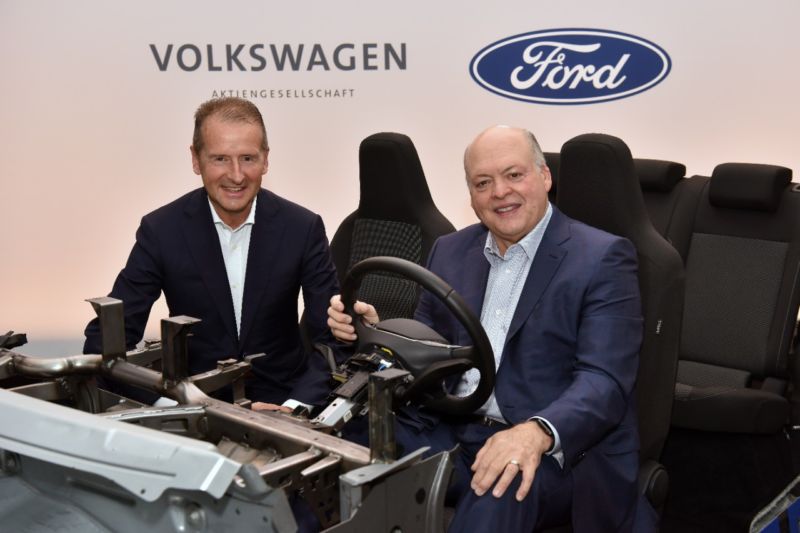
On Friday, Ford and Volkswagen made official news that first leaked last week. The pair are strengthening their alliance to work together on those hottest of emerging automotive technologies, electric vehicles and autonomous driving.
Equal partners in Argo AI
VW will become an equal partner in the self-driving startup Argo AI, putting in $1 billion in cash and another $1.6 billion in the form of Audi’s Autonomous Intelligent Driving spinoff, which will become Argo AI’s European center of operations. Over the next three years, VW will also buy an additional $500 million of Argo AI shares from Ford. (Ford will still complete its billion-dollar investment in Argo AI). Until now, Argo AI has operated as a de facto Ford subsidiary, but this investment makes VW an equal partner, with the remaining shares in the company reserved for employee compensation.
Argo AI’s technology will be incorporated into both Ford and VW vehicles as part of each company’s plans to offer geofenced driverless robotaxis or goods delivery services in the US and Europe. “While Ford and Volkswagen remain independent and fiercely competitive in the marketplace, teaming up and working with Argo AI on this important technology allows us to deliver unmatched capability, scale, and geographic reach,” said Ford President and CEO Jim Hackett in a statement.
This partnership is reflective of a broad industry trend of rival automakers coming together to work on autonomous driving technology. Hyundai and Fiat Chrysler have both invested in Aurora, and Honda is joining General Motors as an investor in Cruise.
100,000 more BEVs a year
Back in January when the alliance was first made public, it was with news that Ford will begin using one of VW’s internal combustion vehicle architectures to build light commercial vehicles for markets outside North America. Now, as suspected, Ford will also use VW’s modular electric vehicle architecture (called MEB) to offer a new battery EV in Europe. These will be designed at Ford’s facility in Cologne, Germany and will go into production starting in 2023, at a rate of 100,000 a year for six years. The two companies say a second Ford-badged MEB-based BEV is also under discussion.
The announcement also gave us insight into VW’s production goals for MEB—a frequent question on the topic. It says it will build 15 million BEVs over the next 10 years. Production of the first of these—the Europe-only ID3—begins later this year at Zwickau in Germany; by 2022 VW says it will have eight factories around the world building BEVs, including its plant in Chattanooga, Tennessee.
“Looking ahead, even more customers and the environment will benefit from Volkswagen’s industry-leading EV architecture. Our global alliance is beginning to demonstrate even greater promise, and we are continuing to look at other areas on which we might collaborate,” said VW CEO Herbert Diess. “Scaling our MEB drives down development costs for zero-emissions vehicles, allowing for a broader and faster global adoption of electric vehicles. This improves the positions of both companies through greater capital efficiency, further growth, and improved competitiveness.”
https://arstechnica.com/?p=1535105

